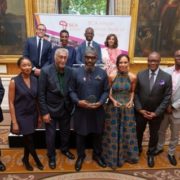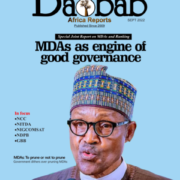The General Manager for University of Jos Consultancy Limited (UCL), Mrs. Bisoye Gofwen talks on her plans to put the consultancy unit on the path of profitability. State funded universities in Nigeria are notorious for being inept in business engagements; Gofwen shares this view but believes it’s about processes and commitments. Once the approaches are right; good results will come, she tells the media teams of IT Edge News and Baobab Africa Reports inside her office in Jos. With over two decades of managing private concerns successfully, Gofwen comes to the consultancy unit with a clean-up mission and a ‘Should Do’ list to get the university’s businesses running again. A mother and a career woman, she talks about the challenges of getting the mixes right. She shares with Olusegun Oruame, Anthony Nwosu and Aanuoluwa Omotosho.
You are University of Jos Consultancy Limited. How would you describe that as a business setup in terms of being owned by an academic institution? Universities are notoriously not known to be good in business.
Universities for starters, like you said, are notoriously not known to be good in business because universities are not set up for business rather as academic institutions and if you look at the memorandum, we have no business being in business. This is why the university sets up a Consultancy Unit. This is the business arm set up by the university to run business for the university, leveraging on the huge human resources that we have and of course you know that University of Jos is one of the biggest and best universities in the middle belt of Nigeria. So with this background, we can go into anywhere, raise our heads high, and say we are looking for business. We are depending on the reputation the university has to source for business. Our memorandum is built in such a way that we can do virtually anything as long as it is going to bring money to the university.
What are you focusing on presently and how do you intend to go about it?
We have a lot of small businesses at the consultancy. We have a guest house; we even have a block industry, and a printing press. We have the University Press Limited under the Consultancy; we have a Sewage Management Unit. We have a Research Department and we have a Business Development Unit. You know, we have little, little units that focus on different businesses. We have the Computer Institute where we are trying to get a license so that the institute can operate as a polytechnic because recently, the Nigeria Universities Commission. NUC came up with this law that if you are not a polytechnic, you can’t grant diplomas. Universities used to have institutes like that granting diplomas through which they were admitting students into the universities. That has stopped.
Which was illegal…?
Well, that’s what NUC says. So we are exploring the ways to legalize that. There are students benefitting from this computer institute. The UITI which is the UCL’s Institute for IT has helped to train a lot of students through which they get admission into schools. Now if you are not given diplomas or any tangible certificates that will help a student get admission into school, why is he or she going to come to you? We are the main institution for that purpose in Plateau State and we have helped a lot of students. So, where that door closes, you find that there are issues, and a lot of students are in trouble. So we have to find a way to open it up so students can benefit from it.
Does your sewage management end strictly at the consultancy level?
For now, all they do is to help institutions and individuals with sewage management, recycling and also how to make wealth from sewage. We are looking to growing into a level where they are going to manage waste, and convert it into something that can be used for other things and you won’t believe, all the waste that they get is not waste because as they are getting it out, there are people who are ready to make use of that waste. So, already, it’s being converted to wealth. We are looking at how to do this in a more standardized structure looking at the environmental impact and all of that.


General Manager for University of Jos Consultancy Limited (UCL), Mrs. Bisoye Gofwen
Does your consultancy explore partnerships with private companies with the kind of competency you might need to achieve your goals?
We are doing that. The university itself is doing that. For us, what we do is we build capacity for entrepreneurs. We do training, mentoring, and capacity building. We also work with co-operatives. We try and help them with access to market, access to finance, and all of that. At this point, we are trying to look at how we can get into some collaboration within the value chain to ensure that we bring value to the immediate community. But you know that there is this NUC thing that says every university at every level must teach entrepreneurship. So the university is already doing that. There is this Entrepreneurship Development Centre in the university. The centre is actually doing things, and helping to build small manufacturing companies. We are supporting the university to see how they can build entrepreneurs; and give the students a place where they can have practical work experience even while they are in school. We are looking at a situation where they can work as they are schooling and get paid. This is not under the consultancy but we are going to partner with these people to help them streamline the structure in a way that the students will benefit from it. We are going to have students of Chemistry, for example, working in companies to they can fit into the quality control sections of the companies, particularly where manufacturing takes place. We are going to have Marketing students marketing products, and having hands-on experience in marketing while still in school. Whatever the department, we will find a way to fix the students in there, so they can have a job. They are going to work in shifts too. Whatever hours will be paid for. Students can have this working experience while in school, and use that to boost their CVs. Most importantly, that helps in preparing them to be entrepreneurs.
Leadership is about impact and I know you just got here. What are your goals? What are the three to five things you want to change or impact?
For now, I am looking at bringing back UCL from where it was, bigger than it was before now; to bring back the days of glory for UCL. Secondly, I am looking at a company where by the time we are done revamping UCL, even bankers will resign their jobs to come and work with us. It is going to be a consultancy outfit that anyone will love to work with. We are looking at injecting life into our business, bringing UCL to the level where it is both self-sustaining us, and also able to sustain the university, its parent-owner. We were set up to make money for the university and we should be profitable irrespective of the economic conditions of the country. We shouldn’t be a drain pipe. We have partners; we collaborate with quite a lot of institutions, we collaborate with NNPC. With any faculty/department, we have in the university, we can do any kind of business as long as we have the competencies in the university and almost every department is represented. The Geology and Mining, department is running consultancy and research for the NNPC. As lecturers are teaching, doing their research, we also have a platform where they can give back to the community while they earn extra income for themselves. I am looking at a way whereby at the end of the day, every department in the university is doing something to give back, and we are seeing the residual value of it in the university. There are no projects that you’ll just do, and finish like that. There must be residual value. A lot of it intangible is knowledge, but you will still have tangible value. There is also the issue of funding. Universities have problems with funds. Their funds are no longer enough. That is another reason you see us here. We are here to do business, to make money to help the university. We hope to get to that level where the university can say: “Oh, we can go to sleep, we can fall back on UCL”
Nigerian universities hardly build partnership with the private sector. How many partnerships is the university looking at, to work with successful companies in Lagos, for instance? How much of partnerships are you willing to leverage on with successful companies in Lagos?
We are ready to go into any kind of partnership. Right now, as it is, we have almost 101 MoUs running on different projects. So, we are very willing to go into PPP, anybody who is willing to work with us. But like I said, there is a dearth of funding and it’s a problem for the university. When it comes to having to spend money, the university cannot do that, but when it comes to knowledge transfer, as long as it will not cost us money, and there will be benefits to all parties concerned, we are very ready to partner with anybody who is willing to do that.
I suspect that most of the people that have been coming to you are those that want to really squeeze money out of you. Often, the big firms won’t bother to come to you. They are only interested in your brand. We started this conversation with one thing, this university has a brand, this UCL has a name, big companies might probably want to leverage on that. How do you go about this?
And we are very ready to work with them. What we want is the residual value of whatever we do with anybody, tangible or not, let there be some value that goes back to the university. So we are ready to work with anybody.
What’s on ground to put UCL back to profitability? You mentioned the guesthouse for example.
My guesthouse is sick. We can do a lot, but patronage has been a bit low. Maybe because of where it is situated and a lot of people felt that it had been living off on its past glory. We are looking to bring it back to life.
What about outsourcing it?
We are looking for people who are ready to manage it for us. Every available option, we are checking out.
How do you manage this? A woman, a mother, a wife, a business woman, and an intellectual, how do you manage the struggles?
Some days I need 48 hours. It’s just grace. I know that these are things I have to achieve. So, as I go long, what I have been doing is, whatever is not important has to go. I just face the things that are important. I have tried going home with work. It comes back undone. So, I have learned to separate the two. When I get home, I am mum. When I am in my business, I am a business woman, and when I am here at UCL, I am UCL Manager, and I am doing UCL work. Of course, UCL work takes 70% of my time.
What will you tell young women out there?
They can do it. Women you can do it. They just have to take away the frivolities. There are a lot of frivolities in our lives. If you are able to move that aside, I sit down and I see some women watching TV, and I am like, where do they get the time? I don’t have the time. I can’t remember the last time I sat down to watch a movie, except when my son says, ‘mummy it’s movie night, you have to be with us’ because they have movie nights on Friday nights. So, I am like ‘why not, put it on’ and while they are watching, I am sleeping. I need to catch up on my sleep; otherwise, I have worked to do. So just move the frivolities aside. What’s not important is not important. You focus on the important ones.
What are your regrets?
I had a five-year span of my life that I could have used to achieve a lot. I kind of like marked time, things needed to fall in place. I regret not achieving the things I could have achieved in those five years. I wish I could have that time again, but you never get the time back.



















